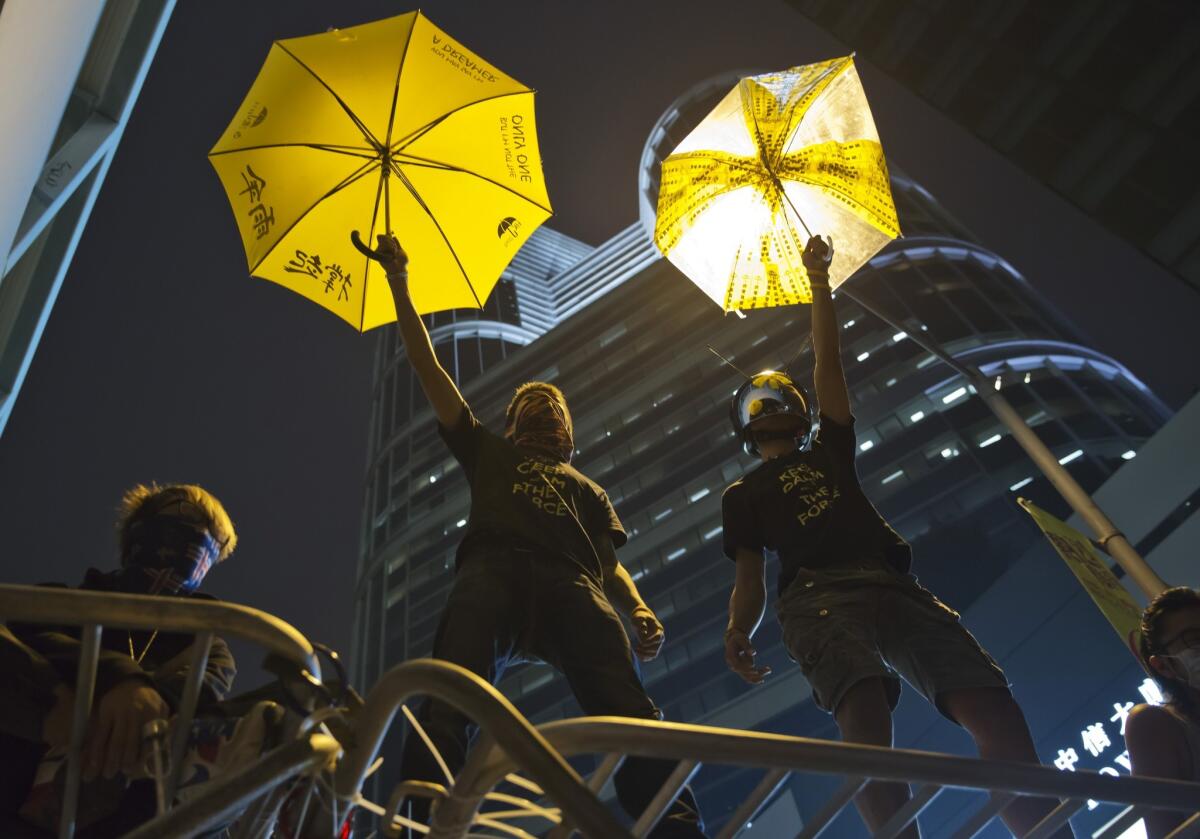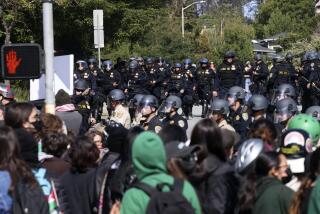Hong Kong protesters rally as police sweep looms

Bowed but not broken, thousands of Hong Kong pro-democracy protesters held what looked to be the final rally of this phase of their campaign Wednesday night as police prepared to clear the demonstrators’ remaining street encampments after daybreak.
Amid chants including “We will be back!” student leaders of the dramatic demonstrations acknowledged that their 74-day sit-in had not forced government leaders in Hong Kong and Beijing to capitulate to their demands. But they thanked supporters and expressed determination to keep up their fight, while suggesting that the events of fall 2014 would leave this semi-autonomous Chinese territory forever changed.
“We cannot lie to ourselves to say we achieved partial victory,” 18-year-old Joshua Wong, head of the Scholarism student group, told supporters massed near government headquarters in the Admiralty district. “In reality, the government has not conceded a single thing.”
But he insisted that the final chapter was yet to be written: “Even if authorities now control our fate, one day we will control their fate,” he said.
Alex Chow, head of the Hong Kong Federation of Students, a college group that along with Scholarism has had a leading role in the protest movement, said demonstrators would not leave the site until the last possible minute.
“We’ll resist till the last moment,” he said. “As long as the government sticks to its decision, we will adopt an approach of civil disobedience.”
The remaining encampments span about half a mile of highway in the heart of the city’s financial and government district.
A local bus company obtained a court order this week allowing the clearance operation to proceed. Government headquarters will be closed Thursday, and some employees of businesses in the area were told to work from home.
In forcibly removing demonstrators from the much smaller, six-block protest site of Mong Kok last month, officers used batons and pepper spray and arrested more than 150 people. More arrests are expected Thursday, as two dozen legislators from the so-called pan-democratic parties that have supported the protests said they would wait for police to haul them off the streets.
“Our arrest doesn’t spell the end of our movement. We’ll sure come back out to the streets,” said city legislator Lee Cheuk-yan. “We’ll unite in walking down this road to democracy.”
How the police handle Thursday’s operation will be closely watched. Twenty members of the city’s Independent Police Complaints Council were expected to monitor the action, following hundreds of requests from the public. Also, a group of university professors planned to don academic regalia and come out to bear witness in an effort to protect the demonstrators, who are predominantly college students.
Protest organizers have appealed to supporters to face off with the police peacefully.
Hoisted above the demonstrators was a newly made banner reading: “They can clear out the roadways -- but not our desire for democracy.” Another one read: “To leave is to pave the way back.”
A survey conducted Dec. 8-9 by Hong Kong University’s Public Opinion Program and released Wednesday found that 49% of the 500 respondents said they were against the ongoing protests, with 31% expressing support. But 46% of those polled also expressed displeasure with how the government has handled the protests.
At the high point of the movement in mid-October, tens of thousands of demonstrators were blocking major thoroughfares, but since then the crowds have thinned considerably to no more than a few thousand.
Hong Kong, a former British colony of more than 7 million people, returned to Chinese rule in 1997 under a framework known as “one country, two systems” and was promised a high degree of autonomy for 50 years.
Protesters in the territory took to the streets in late September after the Standing Committee of China’s National People’s Congress laid down tougher-than-expected guidelines for Hong Kong’s 2017 election for chief executive. The panel essentially decreed that only two or three candidates would be allowed and that all of them must pass muster with a screening committee.
Protesters have sought to pressure the government to revisit the standing committee’s decision and allow open nominations.
Since then, the government has essentially engaged in a strategy of waiting the protesters out, and the movement has appeared to fracture amid the lack of a cohesive strategy among various leaders.
A week ago, the three main founders of Occupy Central With Peace and Love, the organization that first proposed a civil disobedience movement over the 2017 election rules, surrendered to police in a symbolic move and called on other demonstrators to leave the streets and regroup at a later date.
Special correspondent Law reported from Hong Kong and staff writer Makinen from Beijing.
Follow @JulieMakLAT for news from China
More to Read
Sign up for Essential California
The most important California stories and recommendations in your inbox every morning.
You may occasionally receive promotional content from the Los Angeles Times.











